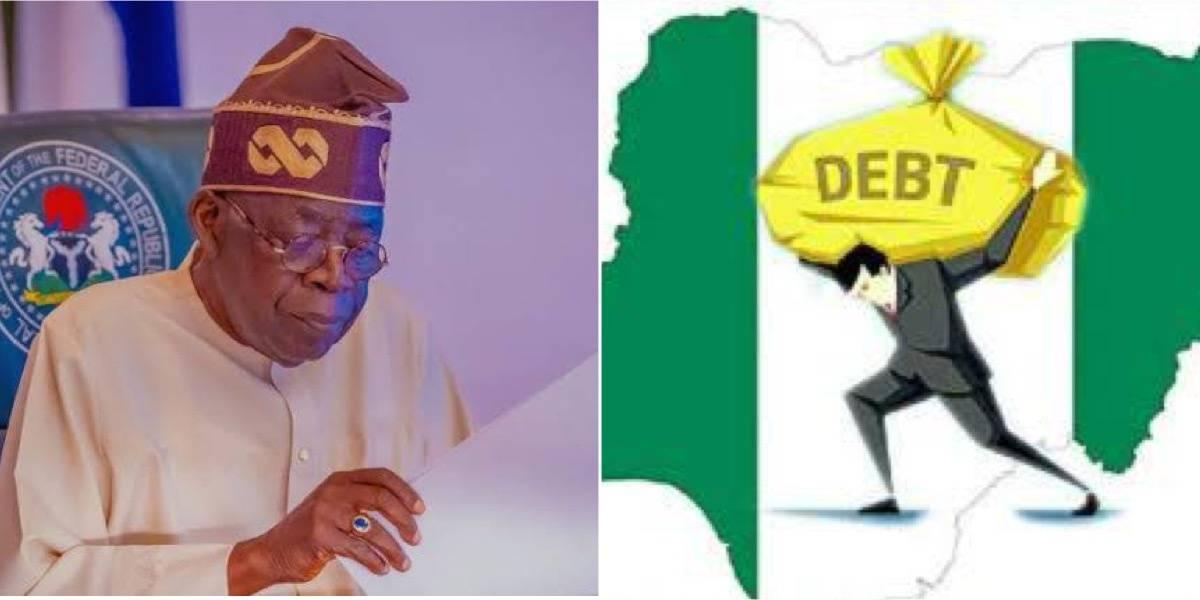News
Tinubu’s New Loan Request Could Tip Nigeria’s Economic Scales— Here Is Why

Nigeria’s debt burden is on track to break the ₦180 trillion ceiling as President Bola Ahmed Tinubu moves to secure fresh loans totaling over ₦34 trillion.
The president’s latest request was presented to the National Assembly in two separate letters read during plenary sessions by Senate President Godswill Akpabio and House Speaker Tajudeen Abbas.
Tinubu is seeking approval for a foreign loan of $21.5 billion, roughly ₦33.39 trillion at the official exchange rate of ₦1,590 to the dollar, as well as an additional ₦757.9 billion in domestic bonds. The bonds, he said, would be used to offset unpaid pension obligations under the Contributory Pension Scheme (CPS).
In his message to lawmakers, Tinubu explained that the new loans would help fund critical sectors like infrastructure, agriculture, education, healthcare, water, and job creation. He said the 2025–2026 borrowing plan is geared toward driving growth, cutting poverty, and boosting employment.
The president justified the borrowing by pointing to the country’s large infrastructure deficit, compounded by shrinking government revenues and the recent removal of fuel subsidies.
“With resources dwindling and infrastructure demands rising, borrowing has become a necessity,” Tinubu noted.
He also acknowledged the government’s failure to fully meet its pension responsibilities under the Pension Reform Act of 2014, a situation he admitted has caused suffering among retirees. The proposed pension bonds, he said, are designed to ease that burden.
“This will help our retirees afford basic needs, access healthcare, and live with dignity,” Tinubu assured.
Debt Already Mounting
This request comes after the federal government borrowed ₦10.85 trillion domestically in just the first four months of 2025.
Nigeria’s total public debt has already ballooned from ₦97.34 trillion at the end of 2023 to ₦144.66 trillion by December 2024 — a 49% increase in just one year.
Even more troubling is the country’s worsening debt-service-to-revenue ratio, which soared to 131% in January and February 2025. This means the government spent far more servicing debts (₦1.399 trillion) than it earned in revenue (₦1.067 trillion) in that two-month period alone.
Mixed Reactions from Experts
Reactions to Tinubu’s borrowing plans have been divided.
Tunde Abidoye, Head of Equity Research at FBNQuest, said the rising cost of debt servicing and reliance on foreign loans are red flags.
“We need to be cautious. These debts could further reduce our already narrow fiscal space,” he warned.
But for Olatunde Amolegbe, former President of the Chartered Institute of Stockbrokers (CIS), borrowing may be unavoidable given the budget shortfall — as long as the funds are used efficiently and repayment is well-managed.
“The issue isn’t taking loans. The real concern is whether we’ll use the money wisely and pay it back without putting more pressure on the economy,” he said.
Amolegbe also pointed out that the idea of pension bonds isn’t new and could offer quick relief to retirees.
“The government can stagger repayments over time while bringing some immediate comfort to senior citizens,” he added.
Economist Clifford Egbomeade agreed that settling pension arrears could stimulate local spending but stressed the need for transparency.
“If this borrowing is tied to sectors that can generate growth, fine. But Nigeria’s rising debt profile demands discipline and clear-cut reforms,” Egbomeade said.
RECOMMENDED FOR YOU
Why Tinubu Is Seeking $21.5bn Fresh Loan and ₦758bn Bonds — Inside His Plan for Nigeria
































